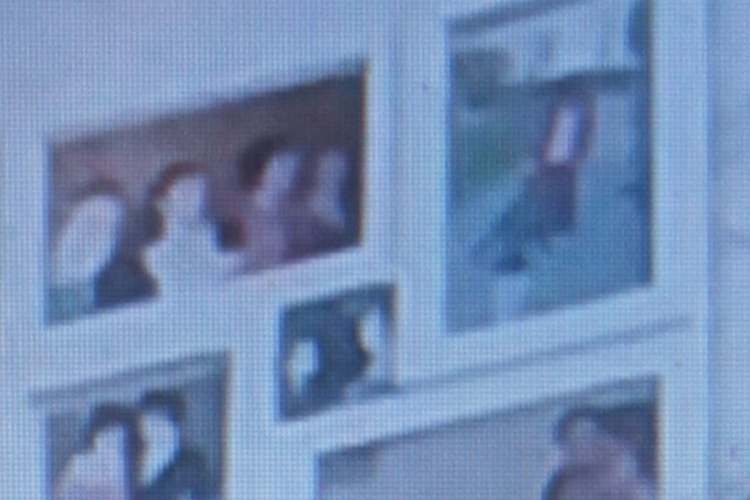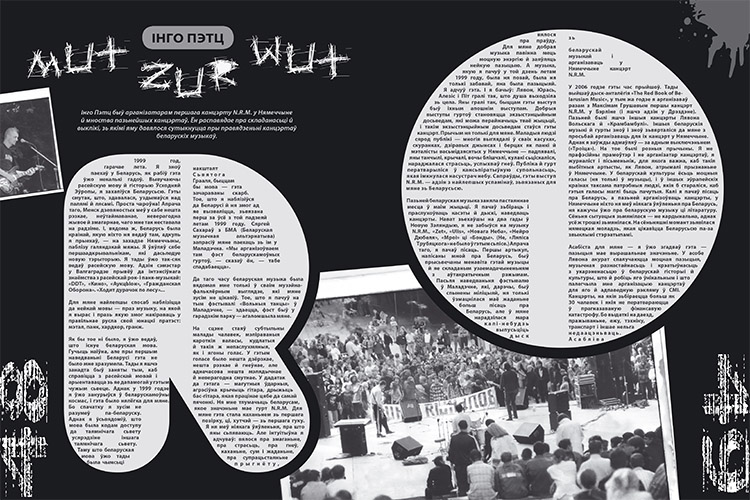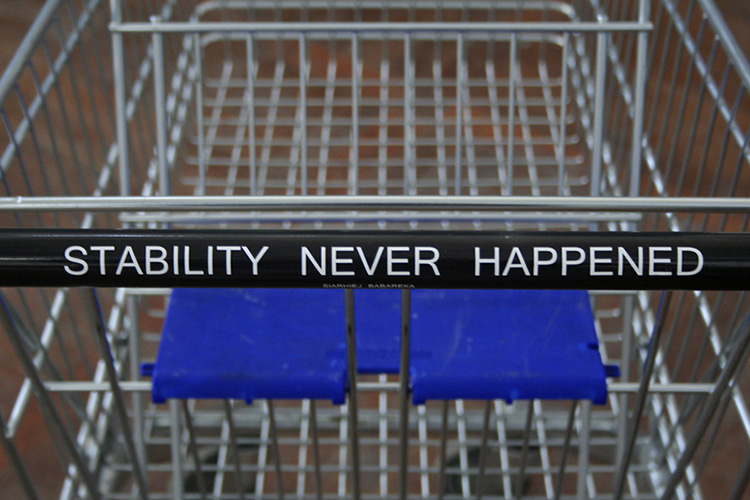
Аўтар: Lida Michieeva, 13/05/2014 | Cult Aktivist SPECIAL
Belarussian Hockey Opera Buffa: Denouement Unknown
The Ice Hockey World Championshipofficially kicks off in Minsk on May, 9. Since May 2009, when the venue of the championship was announced, Belarus has been living through this event (with a particular intensity in the last months of preparation). What changes have occurred in the country so far? How is this event perceived by the Belarussians? What lies to the other side of the facade? And what can we expect afterwards?
The simplest analogy that comes to one’s mind when reflecting on the meaning of The Ice Hockey World Championshipin Belarus is certainly the 1980 Summer Olympics in Moscow. The closed country now opens its tightly clasped arms to the whole world to demonstrate the coffers of culture and spirituality with sport being the culminating point in the country’s official coordinate system. Actually, this sport «mega event» becomes a pretext for not only being hospitable to others, but also for the organization of a self-embracing large-scale exhibition of national economy achievements.
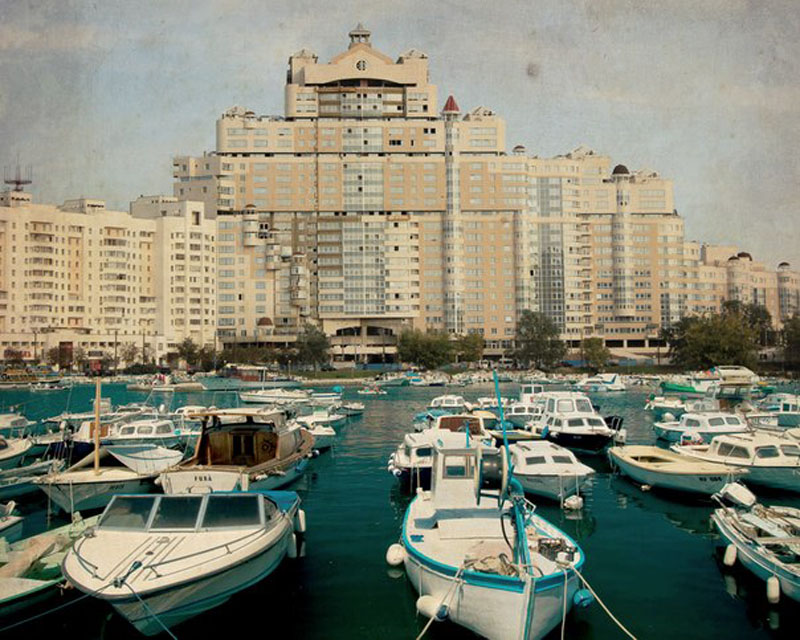
So today, they want to show the guests of the country and the capital «all the best».
Budget and resources were spared neither for hotels immediate construction nor for the urban space improvement. The openings of a new Museum of the Great Patriotic War, a water park and a metro station were timed to coincide with the championship beginning. On the one hand, it is optimistic, because these updates will certainly bring benefits to the society. At the same time, speaking about Belarus, where the dates of the construction of projects of crucial importance are defined not by due terms, but by «fitting» the symbolic opening dates, one can start to worry when hearing in a news programme that an official from the Minsk city executive committee (Minsk City Hall) demanded having the construction completed by a certain date. Yet a metro station or a water park are not the safest and most ordinary facilities the building of which should be demanded at an accelerated rate at any price.
Many other facilities such as hotels were completed according to a similar algorithm, although some of them would not be completed in time, as it became clear a few months ago — for example, the hotel «Kempinski» which triggered the hottest debate and citizens’ discontent. The city authorities are probably afraid to even think whether such a big number of hotels would be demanded after the championship is over.
However, everyone still remembers the recent Olympic Games in Sochi and the comparison with this event for now is clearly in favor of the Minsk Championship. For instance, in Belarus there are no loud scandals involving corruption. Authorities work smoothly, so to say, «on all the fronts». Someone builds, someone coordinates a new payment system on public transport, which fails to function and makes Minsk dwellers pretty nervous, someone prohibits the sale of non-Belarussian beer during the championship period. Loaded with a pioneer-like optimism, cheerfully and persistently local mass media teach ordinary Belarusians to rejoice at the championship as a holiday of sport, health and a high prestige of Belarus on the world arena.
WAR
The holiday of sport which has been «sent down from the top» onto the Belarussian people’s heads following the initiative of the President himself, is reinforced by the Victory Day in the Great Patriotic War annually celebrated in Belarus in a very pompous way on May, 9.
This «coincidence» of the dates leaves no chance for an ordinary Belarussian to stay away from the event (in some state institutions, especially among teaching staff, compulsory attendance in festive clothing is practiced, sticking to the well-known «old days» tradition).
At the level of the official ideology, the symbolism of the “coincidence” must deal with the concept that peaceful sporting competition glorifies the friendship between the peoples of today, while we do pay tribute to the memory of that terrible and bloody war in the course of which the Belarusian people with numerous victims, but still as a part of the USSR, gained the victory. The ambiguity of this alleged «pacifist» transformation of war into sport especially strikes one’s eye on the background of the unfolding situation in Ukraine. The proximity of a real war does not allow us to look at the Second World War as at a half-forgotten page of history that can be flexibly and safely used in the ideological rhetoric that can «decorate» the Victory Day’s event with a championship not really relevant within the suggested context.
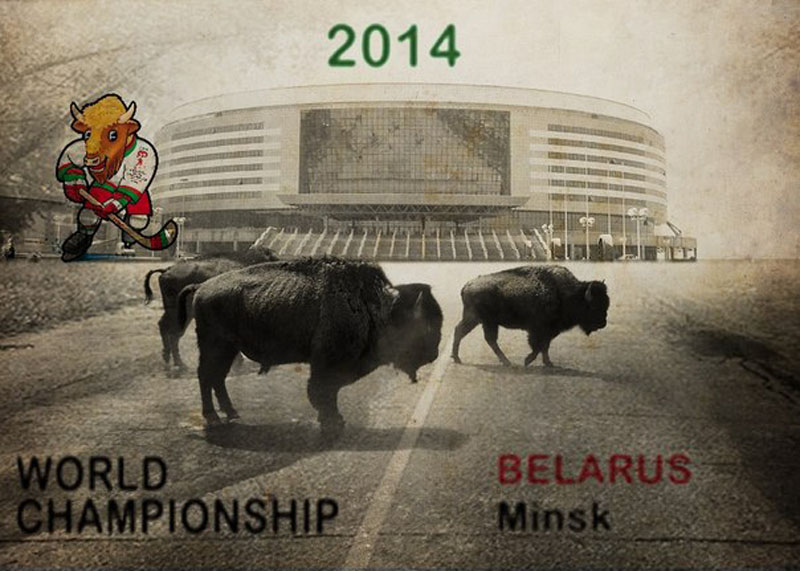
The Ukrainian events significantly spoiled the pleasure of using war symbols by the Belarusian authorities. Marking the Euromaidan supporters in the Russian media as «fascists» and equating St. George’s Ribbon, which used to be associated with the Soviet victory over Germany, with the symbol of current Ukrainian separatists shows how explosive the memories of the war still are and how differently one can make use of certain «labels» («fascists», Bandera followers, etc.) or symbols (a red flag, St. George’s Ribbon).
Small but significant gestures on the part of the Belarusian authorities which banned, for example, the use of St. George’s Ribbons during the Victory Day celebrations, show how difficult it is for Alexander Lukashenko to maneuver in this complex geopolitical context created among the neighboring countries. He is ready to abandon the traditional symbol of victory, replacing the St. George’s Ribbons with the colors of the national flag, just to remain neutral and not to appear in the eyes of the West as a servant of the separatists and «the Kremlin hands».
However, despite all these efforts in a supposedly amicable pathos of big sports as an arena of international competition and friendship the main contradiction remains:
why, in fact, sport is interpreted as a replacement rather than a continuation of war, though with other methods used?
Even the «Eurovision» today turns into a showdown among countries (it was noted long ago that the vote often does not reflect the song’s actual popularity and enjoying the performer, but the loyalty or intolerance of one country’s citizens to those of another one). An excellent example is the confrontation of the Ukrainian and Russian participants which currently takes place at the «Eurovision» song festival: the war goes on other sites and by other means.
Inevitably sport is characterized by the agonal nature – all the time not only the best but also the worst, defeated, losers are identified due to it. Without this any sport is not sport any more, and it is this intrigue of the struggle for dominance which lies at the heart of this great sport’s appeal for authoritarian regimes that seek to portray the whole world and all the forms of human interaction as a projection of hierarchical relations of domination and subordination. Confrontation continues in a hidden, culturally appropriate, civilized manner.
COMPLEXES AND FEARS
And still, the protagonist of the championship, the main exhibit of the exhibition of the people’s achievements, in fact, is not only and not so much urban space with its architecture and transport infrastructure or cultural heritage and the beauty of nature, but the Belarussian him/herself.
How will the Belarussians be seen by the guests of the country and the capital? How will they manifest themselves? Are they «European» enough? Are their manners good enough?
In a country where most city dwellers are only the first generation citizens, the Belarussians have a panic fear to seem provincials, those belonging to «kolchoz». And this fear is often reinforced, for example, by some real drawbacks of the service sector, being shared both by government officials, civil servants, and ordinary people themselves. The fear of not meeting the guests’ expectations is strengthened by the fear (or anxiety) of various instructions provided by the authorities — how to serve guests, what to sell in stores? Will you be able to take an order from a foreign guest, to provide him or her with high standards of services? Will you be able to show a guest the way? Will you be liked?
Latent positive attitude to Europe is more and more prominent with an increasing irritation towards the Russian tourists who occupy Minsk almost every weekend. The Belarussians want to liked by the Europeans, they are tired of being an obliging younger brother of the Russians, who waste money and feel at ease in a cheap (by Moscow standards) Belarus. In this respect, the results of the opinions polls of Russian tourists on the eve of the Championship seem to be rather indicative, the interviewees were surprised of not being able to pay with Russian roubles in Minsk. «Why not? It is so convenient!» they say.
Major complexes of the Belarussians are made visible due to the championship: we are kept isolated and almost never travel around the world, few foreigners visit the country — but now we do get a chance to show everyone our hospitality. Few people had known where Belarus is on the map, and for foreigners entering the country on regular visa terms has always turned into troubles and hassles. And now we do invite all of them (although, with the exception of political and European human rights activists!) to enter the country without a visa, just showing a ticket to the championship. We hardly keep our economy from collapse, and we live in a situation of «dignified poverty»,
and now we can afford ourselves broad gestures, lavish spending, we can treat and splurge only partly hoping that the championship expenses would bring income to the country.
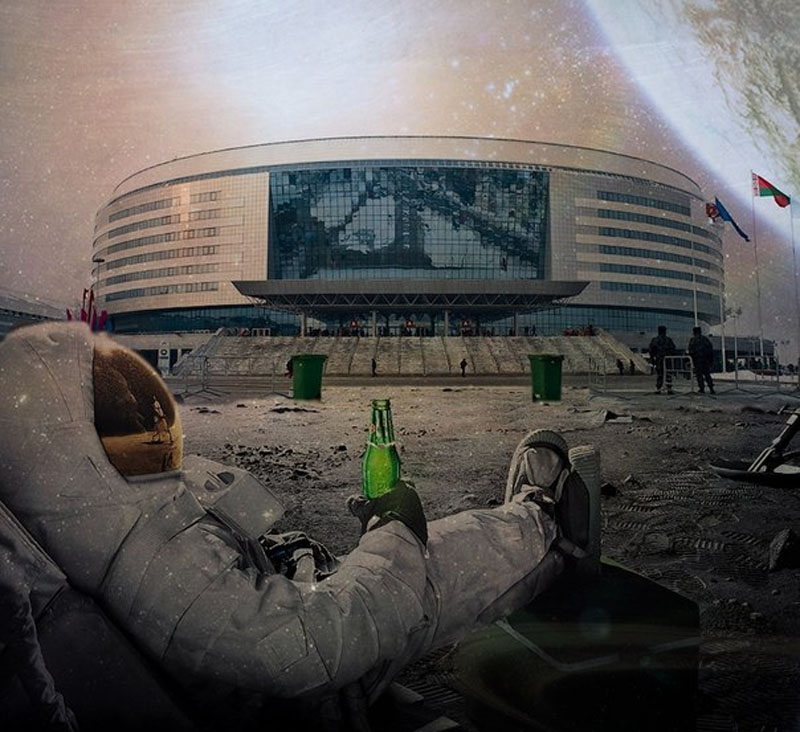
Let the chic new structures consume other public-sector financial resources which might have been spent on social sphere; let the picture of the holiday hide real problems; let the homeless be taken forcibly out of the city to unknown settlements since the presence of these people may upset tourists and drop the unnecessary shadow on the image of the «stable Belarus»; let the wooden private sector, which is still partly present in the city center, be camouflaged with fences or special billboards to hide the dilapidated wooden hovels, located not far from the chic hotels; let the activists be hastily taken to prison for «hooliganism» (just in case) in order to avoid possible provocations. Let it be so.
The main thing is to make everything look beautiful and dignified.
The «refined» view of the city before the championship is not «Potemkin villages» at all, but still a fair share of imitation is present in this accomplishment. We did it all — not entirely for ourselves, but yet mainly for showing off. In order to appear but not actually be.
The complex of a very modestly living younger sister Belarus, overshadowed by the elder sister Russia is compensated by an unpretentious attempt to finally throw off her shoulder a Russian’s heavy hand and have a holiday. If you do not earn, so at least we will have some fun. However, it is important not to lose face in front of the guests. And the Belarussians are really afraid of losing face. This is where the urgent construction of water parks and museums and overall pretty nervous situation comes from — are we all «like others», as the Europeans? Where «the Europeaness» is not found, it is tried to be forcefully and artificially introduced — for example, law enforcement officers, taxi drivers, «trade workers», conductors and inspectors on public transport are urgently taught conversational English.
Diligently, like the sons of peasants who have just mastered the basics of reading and writing, ticket collectors repeat recently learned phrases «Your ticket, please», trying to identify a foreigner on public transport at a glance. Specially designed for foreigners inscriptions in «Belarussian Latin» characters which have just appeared in Minsk metro immediately cause doubt and self-deprecating banter: supposedly a «real» foreigner will not be able to understand anything in this transliteration. On the first day of the introduction of sound announcements in English in Minsk subway the Belarusians were whispering to each other a strange phrase «Mind the closing doooors» with the mix of confusion and smiles on their faces. This is how the upcoming championship enters everyone’s daily life.
IS IT SHAMEFUL TO HAVE ENTREPRENEURIAL SKILLS?
But the strongest complexes, of course, were revealed in the Belarussians not so much about a self-critical evaluation of their being presentable enough, but about the ethics, the normality of «providing services» and earning out of it. Entrepreneurial skills are obviously not developed enough in the Belarussians. And although nowadays there are big businessmen and actively developing small businesses which do occur, the entrepreneurship ethos itself is still associated with some painful anxiety in Belarus.
For example, the taxi driver with whom my friend recently got into talking about the championship, vigorously waved his arms when she expressed her content for all the taxi drivers in Minsk who soon would have the opportunity to earn good money. He, however, was sure that he would not be able to earn, and hockey fans certainly would travel in his taxi drunk, ruining the upholstery, periodically insulting and beating him. «All the taxi drivers are waiting with dread the beginning of the championship,» he said. Is he right in his expectations — we shall soon see, but the fact is obvious:
the Belarussians find it hard to show entrepreneurial risk in order to obtain benefits. It is easier and better to stay aside in a quiet and comfortable setting, albeit with lower incomes.
The Belarussians are also scared of anticipating what this unknown foreigner who would conquer the country would be. If in the past foreigners in Belarus were often either businessmen or sex tourists, or the combination of both, now the Belarusians do not know what to expect from such an amount of hockey fans.
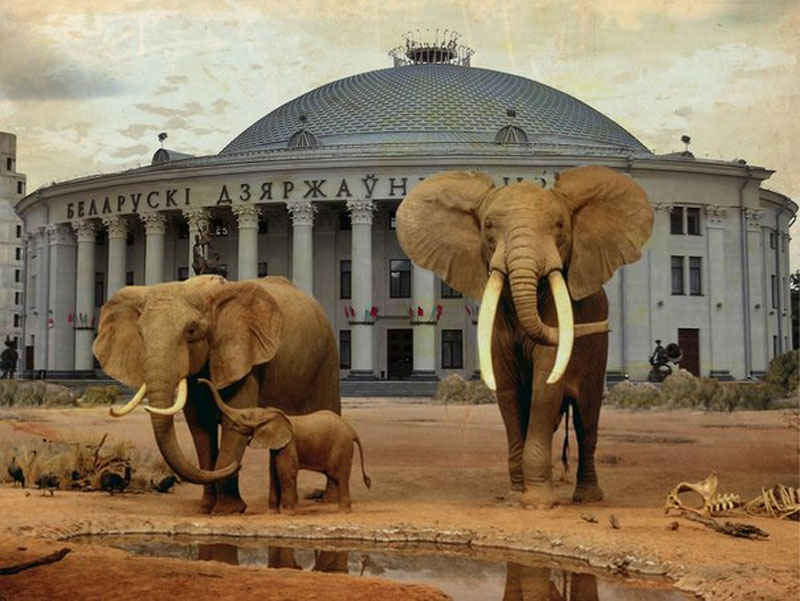
The attitude to sex tourism is twofold in the country. On the one hand, at the national level, the situation is not made evident, patriarchal ideals of feminine beauty are promoted, and the Belarussian girls are proclaimed to be «the most beautiful in the world». Under the auspices of the city and national authorities beauty contests are held, one of which ended with a scandal, as it was found that some of the participants of the contest «failed to meet moral standards», because they worked as a strip and go-go dancers and were regulars of Minsk nightlife.
That is on the part of the state and society, the situation looks rather hypocritical, while Minsk residents and other Belarussians feel a genuine shame about the real situation with sex tourism. Almost everyone knows places where foreigners prefer to meet girls for «not serious relations» and tries to get round them not to be misunderstood. Locations and prices are also approximately known to all. Such awareness, if not of «the national shame,» but evidently about the ugly side of the Belarussian reality creates a certain tension before the championship —
the Belarussians clearly do not want to turn their town into a brothel, but almost nobody dares to talk about their anxiety in public space.
SPORT AND ART
But perhaps the main concern of the Belarussians before the championship deals not as much with the guests and participants decent comfort or the risk of not earning, but only spending money on the event, but with the risk of turning to be fatally boring for the foreigners.
This is where a huge number of exhibitions dedicated to the championship comes from. Among them — both large-scale projects such as «Ten Centuries of Art in Belarus» (not directly related to the championship, but running simulteneous to it), and picturesque exhibitions on hockey sports theme. In Minsk there are about five of such expositions in all the major cities exposition sites. It is needless to say that public areas are very straightforward in talking about the topic of sports: «ceremonial» portraits of athletes are exhibited as well as other works which thematically fit the concept. Even though often it is not really necessary: at the exhibitions one can see just bright textiles, salon sculpture, arts and crafts.
The only exception can be discerned with the art project «OFFSIDE» presented at the Gallery of Contemporary Art «Ў», where the issue of sport is viewed through a critical paradigm and where the findings of a rather scrupolous research of the «politics of sports» in Belarus can be observed. For example, yet incomplete but already famous photoseries «New Olympia» by Siarhei Hudzilin, or Anton Sarokin and Alaksiej Navumčyk’s specially designed project «Object Certificate» dedicated to the construction sites of the city and Paulina Vituščanka’s installation «Olympic Gold» aimed at reflections on sport.
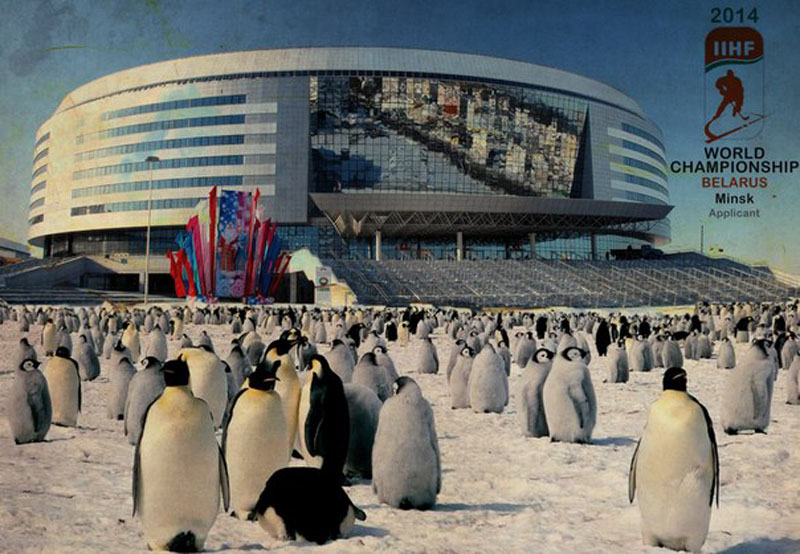
And absolutely «symptomatic» seems to be the phenomenon of the announced event of the Night of Museums, which will combine the theme of sport and «high» art. Perhaps the poster of the Azgur’s Museum looks as the most outrageous in this regard: during the Night of Museums it will host the premiere of «The Hockey Opera Buffa», whereas the whole night will be marked by hockey and scenic, musical and cinematic surrealism. Apparently, it is surrealism, the universal solvent for any kind of foreign inclusions, semantic inconsistencies and unknown, frightening, strange phenomena and ideologies which seemed to be the best form for the organizers to master the theme of hockey and hockey carnival, at the same time not falling into primitivism and propaganda.
Such an ironic, frivolous, fantasy approach to the topic of hockey is a vivid example of the resistance to the semi-official rhetoric which transforms hockey into a state fetish.
Surrealism, opera buffa, carnival, the denouement of which is not yet clear, since all the participants treat everything that goes on with a little bit of anxiety, and rather imitate than really experience festive moods still not being very confident of being able to gain commercial profit — it is in this or a sort of this state that Belarus is standing still before the championship.
So, let us see what happens!
Lida Michieeva. Translated by Volha Bubič
Photos © Gera More
Opinions of authors do not always reflect the views of pARTisan. If you note any errors, please contact us right away.



